I summed up Henry’s birth story with this thought:
Labor was, by far, the most emotionally and physically intense moment of my life. But I look at Henry now and know it worth it. The entire pregnancy, the labor – it was worth it. I really believe that all women should be very proud of themselves no matter how they deliver; there’s no right or wrong way, just what is best for each mother and baby, including their physical and emotional needs. I am very proud of my birth story. But I could not have done it without Bradley Method classes and without the support of Kristien.
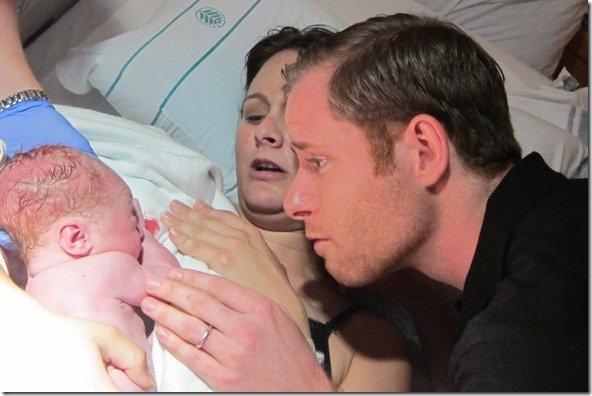
Birth posts are difficult to write because you feel like you’re offending someone by simply writing about what you wanted for yourself. I hope everyone realizes that while a drug-free birth mattered to me, I don’t think there’s anything wrong with others doing whatever is necessary or desirable to them. I’m not going to pepper the rest of this post with tons of disclaimers because it would get incredibly redundant but – again – there’s no right way for everyone to birth, but this was right for Henry and me. I’m writing this post for the women who are considering a drug-free birth, not for people who want to debate the merits of it.
My Pre-Birth Review of Bradley Method Classes talks a lot about what the classes entailed and how they helped me. Bradley Method classes gave me the tools necessary to deliver without pain medication; our class had a total of 10 couples and all but one woman gave birth without medication (the one who needed drugs had an emergency c-section).
Some women have said to me, “I want a drug-free birth but if it gets really bad and I can’t handle it, I’ll just get the epidural.†The women I know with that attitude ended up getting medication (I’m referring again, of course, only to women who had a choice, not ones who medically needed drugs). The reason that I think this attitude doesn’t work as well as, “I will not get pain relief unless there is a serious medical reason to do so,†is that childbirth is REALLY FREAKING PAINFUL. If you are open to drugs, you will probably get them during delivery. I am curious to know if anyone out there in Internetland went into labor thinking they’d like to go drug-free but weren’t super committed to the idea of a natural birth and didn’t end up getting pain relief. I had a drug-free birth because I was extremely committed to the concept. I really wanted it and believed that I could do it. One of my takeaways from my birth experience is that if you want to go drug-free, spend a lot of time learning about natural birth and thinking about why this philosophy matters to you.
Of course, all of this assumes that a woman who wants a drug-free birth is able to safely have one. There are excellent reasons to medically intervene and give drugs (whether pain-relieving or contraction-inducing). I realize that birth is sometimes completely out of a woman’s control; however, I do think women are too often led to believe intervention is necessary when it isn’t (for example, the Natural Alignment Plateau issue). Luckily for me, my birth remained in my control, I had a great midwife and nurse, and the only intervention that was required before Henry was born was an episiotomy (and it was the right decision). Ten weeks later, I remain very, very proud of my birth experience. Childbirth was the most empowering moment of my life.
This thought leads well into the first reader question…
Brie asked, “I’ve been very very very hesitant to say I want to go med-free, because I don’t want to feel like a failure or that something was “wrong†with my baby’s birth after the fact if it doesn’t happen. You were so open about it on here that I imagine there were a lot of expectations going in. I feel like I read a lot of blogs and stories where women hype up drug-free labor and delivery SO MUCH, and then something goes wrong and they’re crushed. So I guess I’m curious as to your take on that.†(Emily B asked a similar question about pain relief.)
Lots and lots of readers expressed concerns over my birth plan, stating that I was too committed to a particular birth scenario and was destined to be disappointed. While this objection to birth plans makes some sense, I’d argue that you must be committed to the idea of a drug-free birth to make it happen. Did that mean that I was going to have a meltdown if I got pain relief? Not at all! During one of our Bradley classes, the instructor told us something that really stuck with me: Even if you end up getting drugs to ease the pain or speed along contractions, the longer you ‘hold out,’ the longer the baby has had a drug-free birth experience. Additionally, I knew the most important thing was getting Henry out safely. If I received medication, it was going to be because I really, really needed it. Therefore, if I had drugs, I wouldn’t feel bad – there was an emergency, and I overwhelmingly would’ve just felt relieved it was all okay.
Repeat after me: At the end of the day, the birth really is just one day. It’s an important day, but it’s just one day.
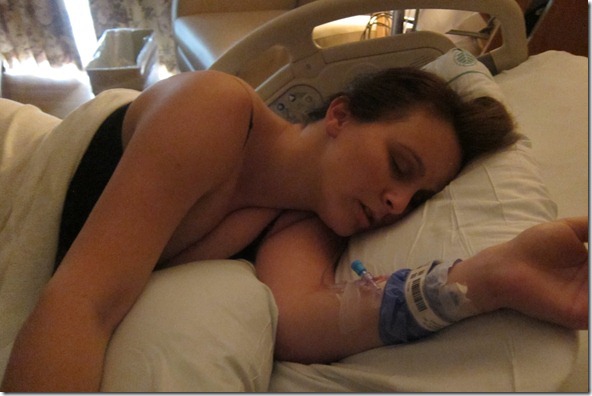
Did I feel ‘pressure’ because of the blog to refuse pain relief? Honestly, hells to the no. That’s because it was something that I really wanted for me and for my baby, not for show. Trust me, going through drug-free childbirth is not something that I would do just to impress someone else! If you’re considering a drug-free birth, I would just take some time to explore why you want it and how important it is to you. Also ask yourself what’s ultimately so bad about having a different birth experience if your hopes don’t pan out (the answer is not much – the baby’s health is the priority). If you’re in labor and things don’t seem to be going the way you’d want them to, remember there are many ways to preserve the general feel of your wishes – for example, my friend who had a c-section made sure her baby did skin-to-skin contact with her husband once the medical team cleared the baby.
Amanda wrote, “What relaxation methods did you find most helpful? Did you really practice the methods/exercises beforehand? Did they pay off during labor? Were you still nervous in the weeks leading up to labor?â€
I did practice some of the relaxation techniques beforehand – whenever I felt ill, I would practice letting my whole body go limp and take my mind to my happy place. But I didn’t do my ‘homework’ every night or even every other night. Relaxation worked in the initial stages of labor, but once things really got going, I just rode out the pain. Actually, long distance running and triathlons prepared me more than anything. I was used to my body hurting and not being able to stop. Additionally, I feel that staying active through the end of my pregnancy was so important. I knew my body was in shape and could pull through the tough physical demands of drug-free labor. This gave me a lot of confidence.
What was most helpful for me was knowing what my body was doing and why. I would’ve FREAKED OUT during transition if I didn’t know what was happening and that it would end soon. I visualized what was physically happening to my cervix and uterus and pictured the baby moving down. And I was nervous in the weeks leading up to labor, but again, I felt very well-prepared thanks to Bradley. I think preparation is key.
Jordan asked, “I wonder, if you get pregnant again, do you think you will you go drug-free again? I know it is painful, but do you attribute getting through it so well to Kristien and the Bradley Method classes?â€
I will definitely attempt to go drug-free again. I think some women want pain relief because it makes them feel more in control of the birth experience; however, the thought of introducing drugs into my system during labor makes me feel totally out of control. That’s not to say that I was cool, calm, and collected during labor – I was a screaming, thrashing, cursing beast of a woman. I was an animal. But I knew that everything happened to my body was supposed to be happening – the contractions weren’t being artificially induced or strengthened, for example. That made me feel in control of what was happening and is why I’d ultimately opt out of pain relief next time. If you could 100% guarantee that I could get an epidural and not trigger a cascade of medical interventions (which happens!), I would possibly reconsider… I’ve heard of women reading magazines during active labor thanks to an epidural; that sounds nice.
Katie asked, “Can you please explain what contractions feel like? I’ve heard they start off like menstrual cramps, but what does it feel like as they get stronger? I keep wondering what this “worst pain of your life†is like…. Also, is the pain constant or does it last only as long as each contraction (i.e. 30-90 secs or so). I would love to hear a detailed explanation of what contractions/labor pains feel like (if you can remember, you may have blocked it out!)â€
I loved this question because I asked the same question to my Bradley instructor! My labor begin with my water breaking, and it took a few hours to have a contraction. Early contractions do feel like super intense menstrual cramps. Later, in serious labor, it feels like… well, it feels like someone is wrenching something inside you wide open and shoving a 7-pound baby through the opening. The sensation is deep , which I found disconcerting because I had not felt serious internal pain before. After a point but before you start pushing, the contraction pain is constant; as I said, transition was really rough (can you tell I hated transition?). Once you start pushing, there is constant sensation but it is not intense and constant pain. Your body is very smart – if you get too tired, it will begin to space out your contractions to give you a two to three minute break from pushing. There were times during the three long hours of pushing that I just laid on the table, calmly staring at the ceiling and waiting for another contraction. There is pressure during these breaks but I wouldn’t call it pain. Also – the pain is intense. So intense. But it is bearable. The thing about childbirth pain is that it has an end point. It doesn’t go on forever. You just have to try to ride it out. I think this attitude about pain (“This is terrible but it won’t last for eternityâ€) was really helpful for me.
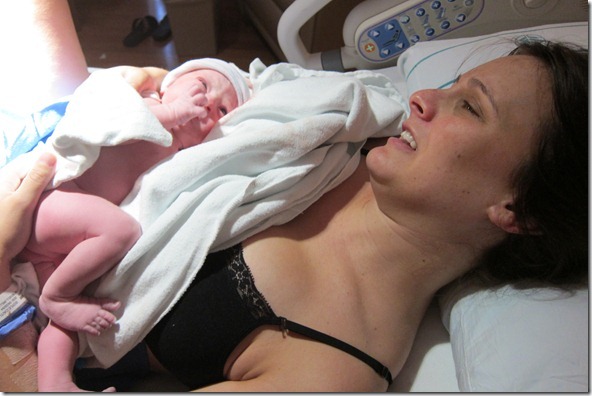
Laura wrote, “I was curious about the "ring of fire" I’ve heard people mention and if you actually felt it giving birth? Also, would like to see update stomach pictures like you did the week after-so curious to see what it looks like for a normal person after giving birth.â€
The ring of fire refers to the pain you experience when the head crowns at the vaginal opening. I think that I did not experience the ring of fire because I had an episiotomy. Or maybe I was just naturally numbed from the pressure of Henry’s head (again – our bodies are so smart!). At one point, the nurse did say, “This is when it is really going to hurt,†and I was kind of like, “Um, lady – it ALL hurts; I am birthing a baby sans drugs.†Hah.
Here are post-birth stomach pictures! Please excuse the creepy bathroom pictures and pajamas. (Reminder: I looked like this at 39 Weeks.)
Erin wrote, “I’m really curious about what Kristien thought during your labor and delivery. I feel like so many blogs are written from the mothers point of view (obviously, since it’s 90% women who write them) that we don’t hear as much from the fathers/partners perspectives through the experience. It must be really scary for them to see the person they love so much in extreme pain/discomfort. I’m curious as to what he was thinking, how he stayed calm, helped you through, if he thought the Bradley Method was helpful, etc.â€
I asked Kristien if he would respond to this question, and here’s what he said… “I thought Caitlin was so strong during delivery, but I wasn’t surprised at the way she handled it. I was very confident that she could have a drug-free birth if the situation allowed for it. I wasn’t as nervous as I expected to be, in part because of my Bradley training. It was helpful for me to know why certain things were happening and to feel educated in potential interventions so I could help Caitlin make sound decisions. I stayed calm because I knew that staying calm was my one and only job. I expected Caitlin to be vocal and cry a lot, and although I didn’t like watching it happen, it was okay because we were both prepared for it. A few of my friends told me that I would never look at her the same way after I saw her deliver, but I think that’s an odd thing to say – childbirth is raw and messy but perfectly normal and natural. Bodily fluids just don’t bother me. Caitlin said afterwards that she felt bad that I had to stand up on my feet for so long, which was very nice of her! I was very tired by the time it was all over – we had been up over 24 hours. But mostly, I was just so excited that things had gone well and that Henry was here.â€
Kendra wrote, "Are you still taking the placenta capsules? How much of a supply do the capsules provide? I know you don’t have anything to compare your experience to but do you really think the capsules helped with your hormones/mood?â€
I wrote about my placenta pills in this post. In summary, I do think they made a huge difference (I had a one month supply) and will definitely encapsulate my placenta again.
Brooke wrote, “Do you think having a baby (not the birth, the every day life of raising Henry) is harder than you expected?â€
It is actually WAY easier than I expected. Henry is such an easy baby; we are really blessed. He is very smiley and joyful and independent. Sure, there are trying moments and life is different now, but it is so much better than I imagined it. I say this because for years, I was terrified to have children, thinking it would be the end of life as I knew it, but it’s not always like that. Sometimes, it is just fine. Minus the poop explosions.
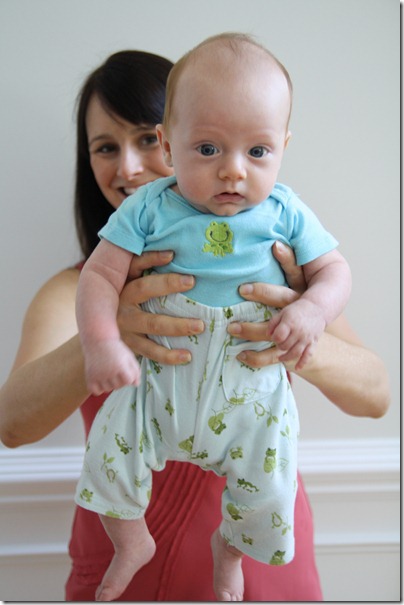
I could do without poop explosions. Especially ones that occur in the baby bathtub (why Henry, why?).

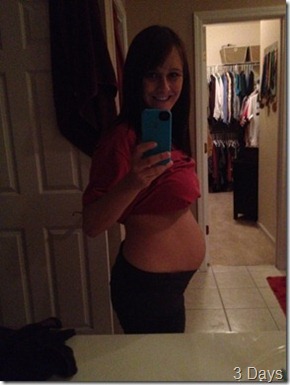
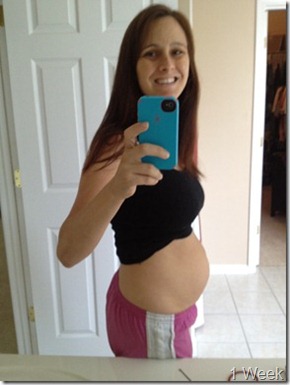
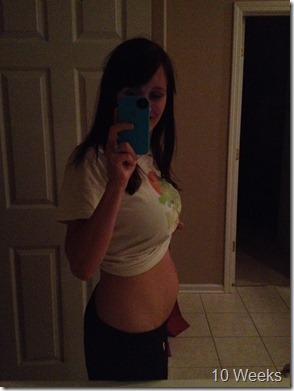

What a great post. I love the way you shared “your” story. I always think it is fascinating to read about birth experiences because each one is so unique. I’m due with my second in just 6 weeks. Congrats, Caitlin!!